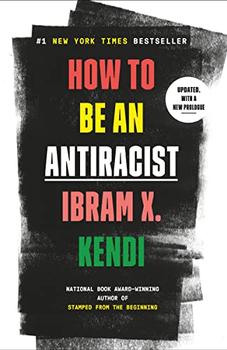Summary | Excerpt | Reading Guide | Reviews | Beyond the Book | Readalikes | Genres & Themes | Author Bio

Chapter 1
Definitions
Racist: One who is supporting a racist policy through their actions or inaction or expressing a racist idea.
Antiracist: One who is supporting an antiracist policy through their actions or expressing an antiracist idea.
Soul Liberation swayed onstage at the University of Illinois arena, rocking colorful dashikis and Afros that shot up like balled fists—an amazing sight to behold for the eleven thousand college students in the audience. Soul Liberation appeared nothing like the White ensembles in suits who'd been sounding hymns for nearly two days after Jesus's birthday in 1970.
Black students had succeeded in pushing the InterVarsity Christian Fellowship, the U.S. evangelical movement's premier college organizer, to devote the second night of the conference to Black theology. More than five hundred Black attendees from across the country were on hand as Soul Liberation began to perform. Two of those Black students were my parents.
They were not sitting together. Days earlier, they had ridden on the same bus for twenty-four hours that felt like forty-two, from Manhattan through Pennsylvania, Ohio, and Indiana, before arriving in central Illinois. One hundred Black New Yorkers converged on InterVarsity's Urbana '70.
My mother and father had met during the Thanksgiving break weeks earlier when Larry, an accounting student at Manhattan's Baruch College, co-organized a recruiting event for Urbana '70 at his church in Jamaica, Queens. Carol was one of the thirty people who showed up—she had come home to Queens from Nyack College, a small Christian school about forty-five miles north of her parents' home in Far Rockaway. The first meeting was uneventful, but Carol noticed Larry, an overly serious student with a towering Afro, his face hidden behind a forest of facial hair, and Larry noticed Carol, a petite nineteen-year-old with dark freckles sprayed over her caramel complexion, even if all they did was exchange small talk. They'd independently decided to go to Urbana '70 when they heard that Tom Skinner would be preaching and Soul Liberation would be performing. At twenty-eight years old, Skinner was growing famous as a young evangelist of Black liberation theology. A former gang member and son of a Baptist preacher, he reached thousands via his weekly radio show and tours, where he delivered sermons at packed iconic venues like the Apollo Theater in his native Harlem. In 1970, Skinner published his third and fourth books, How Black Is the Gospel? and Words of Revolution.
Carol and Larry devoured both books like a James Brown tune, like a Muhammad Ali fight. Carol had discovered Skinner through his younger brother, Johnnie, who was enrolled with her at Nyack. Larry's connection was more ideological. In the spring of 1970, he had enrolled in "The Black Aesthetic," a class taught by legendary Baruch College literary scholar Addison Gayle Jr. For the first time, Larry read James Baldwin's The Fire Next Time, Richard Wright's Native Son, Amiri Baraka's wrenching plays, and the banned revolutionary manifesto The Spook Who Sat by the Door by Sam Greenlee. It was an awakening. After Gayle's class, Larry started searching for a way to reconcile his faith with his newfound Black consciousness. That search led him to Tom Skinner.
Soul Liberation launched into their popular anthem, "Power to the People." The bodies of the Black students who had surged to the front of the arena started moving almost in unison with the sounds of booming drums and heavy bass that, along with the syncopated claps, generated the rhythm and blues of a rural Southern revival.
The wave of rhythm then rushed through the thousands of White bodies in the arena. Before long, they, too, were on their feet, swaying and singing along to the soulful sounds of Black power.
Every chord from Soul Liberation seemed to build up anticipation for the keynote speaker to come. When the music ended, it was time: Tom Skinner, dark-suited with a red tie, stepped behind the podium, his voice serious as he began his history lesson.
Excerpted from How to Be an Antiracist by Ibram X Kendi. Copyright © 2019 by Ibram X Kendi. Excerpted by permission of One World. All rights reserved. No part of this excerpt may be reproduced or reprinted without permission in writing from the publisher.
Your guide toexceptional books
BookBrowse seeks out and recommends the best in contemporary fiction and nonfiction—books that not only engage and entertain but also deepen our understanding of ourselves and the world around us.